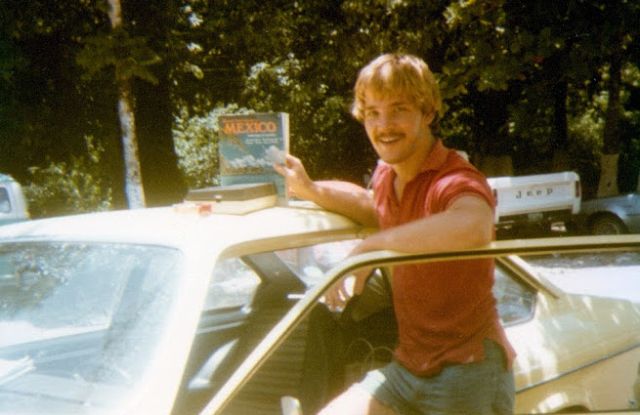Do you suffer from hurry sickness?

 It’s 1:19 a.m. and I’ve been going strong all day. And I’m thinking about what to do about this pattern I’m in. Maybe I need to make some changes to my life. Maybe I’ve got a touch of something doctors call “hurry sickness” and need to slow down. My body is crying for a break and some of my habits can’t be helping. And maybe you struggle too. If so, let’s you and I decide to make some changes. Take a closer look by taking the quiz below and decide for yourself.
It’s 1:19 a.m. and I’ve been going strong all day. And I’m thinking about what to do about this pattern I’m in. Maybe I need to make some changes to my life. Maybe I’ve got a touch of something doctors call “hurry sickness” and need to slow down. My body is crying for a break and some of my habits can’t be helping. And maybe you struggle too. If so, let’s you and I decide to make some changes. Take a closer look by taking the quiz below and decide for yourself.
A prominent doctor, Barton Sparagon, said, “When you look at our heart rates, brain wave patterns-our basic physiology has not evolved to keep pace with the technology…we are hard-wired to be able to handle a “fight-flight” response where the stress ends within five to ten minutes. In our current culture though, we struggle for hours on end.”
My good friend Ron Walborn, who heads up Nyack Seminary in New York teaches on this subject because it’s so pervasive and pastors have to deal with it all the time. Here’s a quiz he put together to diagnose yourself:
1. Do you often feel in a hurry to get things done?
a. Never or rarely b. Occasionally c. Often
2. Do you tend to walk fast?
a. Yes b. No
3. Do you tend to talk fast?
a. Yes b. No
4. Do you get irritated or upset at other drivers or when stuck in traffic?
a. Never or rarely b. Occasionally c. Often
5. Do you find it difficult to just sit and daydream or recall memories?
a. Never or rarely b. Occasionally c. Often
6. Do your spouse, friends, or colleagues ever tell you to take it easy or slow down out of concern?
a. Never or rarely b. Occasionally c. Often
7. How often do you find yourself interrupting the person with whom you are talking?
a. Never or rarely b. Occasionally c. Often
8. Do you get impatient while waiting in line or in traffic?
1. Do not wear your watch for the day.
2. Do not drive in the fast lane. Smile and wave at people who pass you and/or cut you off.
3. Seek out the longest line to wait in. Recall fond memories, observe other people while you wait and pray for them.
4. Listen to music in solitude and do nothing else for 15 minutes.



Well I definitely fail the test 6 days out of the 7. However, I do (Glory to God) indulge in Sabbaths at least 3 Saturdays a month… hard core too. Stay in the pj ones.
I definitely have to work on the other 6 for real!
Being a chronic sufferer of “Hurry sickness” myself I took the steps listed above last summer to find my remedy. Slowing down and driving The speed limit and not the 9 mph over that I have grown accustomed to was the biggest challenge. One day while I was puttin’ along a police officer pulled up next to me and gave me a glance. I just grinned and kept driving. He pulled me over! He said he pulled me over because I looked suspicious. Why I ask? “Lady your driving slow, holding up traffic and smiling.” I quickly shared with him how the Lord was calling me into obiedence in this area of my life. We talked at the side of the road for 20 minutes all about our love for the Lord and his live as a boy in Africa. At the end of the talk he wept and said ” I was praying this morning for the Lord to show me why my life is spinning out of control. I too will slow down” Thank you Jesus!!!!
Great story Tami! I love it!
As a doctor, I wholeheartedly agree. I bet not a day goes by where I don’t see at least 2-3 patients whose illnesses are caused by the worries of life and rushing through it. I know my prayer time grew by 20-30 minutes when I started going the speed limit. It also reduces the stress of worrying about patrolmen. I should print this out and put it in my waiting room!
Seth, I have not decided yet whether this is timely or I don’t like you anymore.
good for you pops – uncle andrew would be proud
Keith,
Ha! I’ll write about harboring offenses next.
Its good to hear I`m not the only one working on this problem of overdrive living. I had a police officer remind me to slow down while riding my cycle. He gave me a $130. fine to make sure I don`t forget, bless his heart.
Seth-
Obviously a topic that hit a nerve… I bombed Ron’s quiz bigtime. Good comments by Tami (I’m a proponent of the +9 mph too ;^) and I know I need to slow down. I will see if I can go the speed limit on the way home today. The toughest thing is when I try to slow down (driving or in life) I often feel guilty that there is something I should be doing.
There’s a man named Jack Groppel (I think) who studies athletes – trying to determine what separates the really great ones from the almost great ones. He analyzed tennis players and found no difference in how they hit the ball, training, etc. But when he tracked their physiological patterns, he discovered that the really great ones were the ones who had learned how to “rest” in the 15 seconds between when a point was over and the next ball was served. Their heart rate was lower, their breathing was slower and so on. But it wasn’t a matter of overall conditioning or overall shape they were in – there was no difference between the great and almost great on that count. It was the ability to claim even those few seconds of rest. So – to the degree that we can learn to build even small amounts of rest into the pattern of our days we are better off.
Why, oh why do I come back to read the comments? I always get convicted! Yes, ok, fine… I will try harder to drive the speed limit… I remember in a recent blog of yours, you wrote that not speeding can actually make you happier too… hmmm….
Glad to know I am in good company, it really s**ks to be wired this way!! tks for the suggestions 🙂 I’ll give them a try and we will see…..
Seth your counsels are good. What can I say? You need to come to Lagos for 2days and take a drive on our roads. You may need to add more helps for those of us living here.
Think of a place where the roads are unmarked, you are hardly ticketed for over-speeding nor for driving on the sidewalk to avoid a crazy traffic JAM… a stand-still case, caused by 15 insane commuters (one of them could be me) trying to be the first to squeeze through a narrow a path block by another crazy driver, who feel he’s more in a hurry than the rest of us. This blog is not about driving, but I think that each day when a Christian gets into his car here, he needs to pull out his sanctification and place it squarely before his eyes on the dash-board. Else, he’ll curse it away in 3minutes of driving here.
I think that “10 out of 9” of us are serious suffers and need spiritual and medical attention. The sense of urgency and emergency here is ridiculous. God save us from self destruct.
One new year’s eve I decided to spend the evening taking stock of the previous year and praying about the new year, asking God for goals and targets of things I should be aiming at. Praying through the previous year was really helpful, the clock turned midnight and I turned my attention to the New Year. God took me to a place of complete peace and resting in Him. I pestered and pestered for goals and targets, but all He would say was “*This* is your goal, pursue this”, meaning the peace and closeness I had with Him at that moment.
I find it really encouraging that we are not physiologially designed for a life of pressure and stress – that makes it obvious that this way of life really doesn’t please God, whatever I tell myself! I can feel under so much obligation to redeem the time, make the most of every opportunity that I can justify my stress – thank you for letting me know that I’m wrong to do that!
Peace to you all,
Saz
<><
thank you for your article and suggestions dear seth branes
I would like to know what my score is
I have adhd and never heard of hurry sickness untill today. I work as a landscaper so am always busy and can’t not understand how my mate can’t work as quick as me. Drives me crazy! Even having lunch I don’t see the point in stopping working. Have your sandwich and carry on. Which I know is wrong but I can’t help it. Also stopping for a tea. I just think that’s a total waste of time when at work. I get home and think how stupid I am as I finished the job early and was no need to rush. I’m constantly in a race in any task I do and 9/10 times I do it the quickest against anyone I’m with. Doesn’t matter what it is, or if I’m going slower, I’ll try my absolute best to be quicker or pretend like I don’t care if I know I can’t win and give myself excuses. I even don’t walk up to the thing I’m picking up because I’ve worked out in my head that it’s quicker the stop and really stretch for it rather than walking up to it and simply picking it up. I HATE being late especially when my girlfriend is making me late. I just constantly pace up and down and get very stressed about it. If I’m doing some toast for example. I will put the bread in the toaster and get everything possibly set up for it. Even put the butter on the knife so can straight away spread it on the toast as saves time. I make the odd error at work due to doing everything really quick as not stopping and thinking for even 10 seconds as I see it as 10 seconds lost and a waste of time. Can’t stress enough how crazy it drives me. To constantly trying to do everything as quick and efficiently as possible.mainly when I’m at work as am very passionate about my job. I love it. It’s worse in the winter as I work outside and gets dark around 3:30/4 so we have to be gone for about 4:30 as can’t see. So have a definite time I need fo finish the job by, rather than the summer. For example I finished at 7:30pm today. So had time to complete the job.
I’ve read some comments and it really made me feel good that I’m not the only one. Hopefully some people can relate to some of what i go through!
Ben
Interesting!